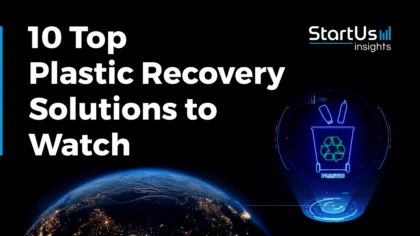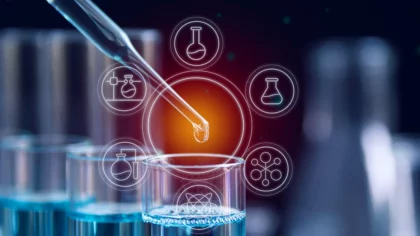The 2025 Chemical Engineering Startups are driven by innovations in materials science, process optimization, and sustainable manufacturing. From novel catalysts and carbon capture technologies to AI-powered chemical processes, startups are increasing efficiency, environmental impact, and industrial scalability. Collaboration, adaptive business models, and emerging technologies are shaping the sector, offering industry leaders strategic insights to navigate this evolving market.
Global Startup Heat Map highlights 10 Chemical Engineering Startups to Watch
Through the Big Data & Artificial Intelligence (AI)-powered StartUs Insights Discovery Platform, covering over 5M+ startups, 20K+ technology trends plus 150M+ patents, news articles & market reports, we identified 10 chemical engineering companies.
The Global Startup Heat Map below highlights the 10 chemical engineering startups you should watch in 2025 as well as the geo-distribution of chemical engineering startups & scaleups we analyzed for this research.
According to our data, we observe high startup activity in the UK and the US, followed by India. The top 5 Startup Hubs for chemical engineering are London, New York City, Bangalore, Mumbai, and Singapore.
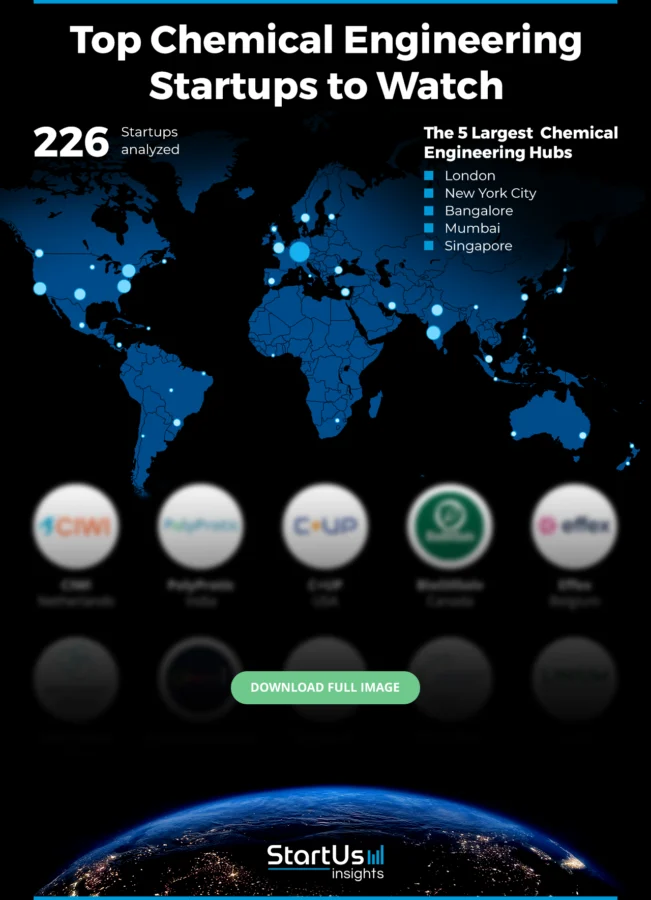
Meet Emerging Chemical Engineering Startups to Watch in 2025
We hand-picked startups to showcase in this chemical startup report by filtering for their technology, founding year, location, funding, and other metrics.
These 10 chemical engineering startups work on solutions ranging from water treatment chemicals and sustainable chemical solutions to carbon capture & utilization technology and low carbon chemical manufacturing.
- CIWI – Water Treatment Chemicals
- PolyProtic – Sustainable Chemical Solutions
- C+UP – Carbon Capture & Utilization Technology
- BioOilSolv – Low Carbon Chemical Manufacturing
- Effex – Design of Experiments (DoE)
- MECHANO CROSS – Mechanochemical Organic Synthesis Technology
- ChemInnovation – AI-supported GC-MS Evaluation
- RarEarth – Rare Earth Recycling
- Deep Blue BioTech – Cyanobacteria Technology Platform
- Linium Biochemicals – Green Aromatic Chemicals
1. CIWI
- Founding Year: 2023
- Location: Delft, Netherlands
- Use For: Water Treatment Chemicals
- Funding: Received a USD 26K grant from the Rabo Impact Fund.
Netherlands-based startup CIWI develops metal-based water treatment agents that are manufactured on-site within water treatment plants to eliminate the requirement for external chemical transportation.
The startup’s technology reduces chemical waste and operational inefficiencies by producing coagulants directly at the treatment site through a regulated reaction process.
This technique improves water purification by limiting pH interruptions, reducing the amount of leftover sludge, and lowering the total saline content of discharged water. This method also increases the possibility of water reuse, which makes treatment more environmentally friendly.
Additionally, CIWI’s solution offers cost-neutral operations and integrates easily into current infrastructures, requiring minimal modifications. It benefits municipal and industrial water treatment facilities in maximising performance and lowering operational risks.
2. PolyProtic
- Founding Year: 2023
- Location: Vadodara, India
- Use For: Sustainable Chemical Solutions
Indian startup PolyProtic provides specialist chemical solutions for waste recycling, process optimization, and metallurgy.
The startup’s product, MetScav 90, is a high-efficiency solvent extractant that enhances metallurgical processes and selective cobalt recovery from spent lithium-ion batteries. The product maximizes refining efficiency and minimizes material losses by separating cobalt from nickel through the use of pH-dependent extraction processes.
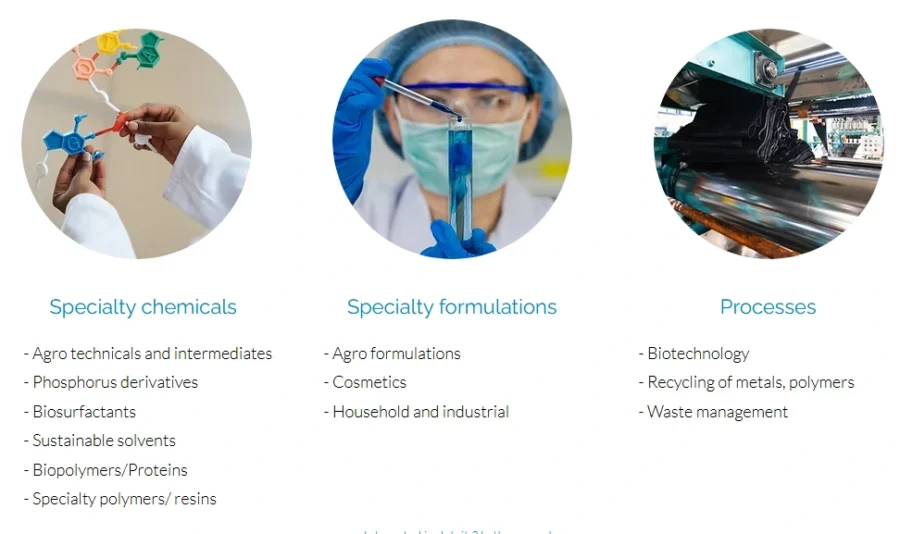
The MetScav D2EHPA efficiently extracts rare earth elements, uranium, copper, and nickel. MetScav NF facilitates the separation and recovery of nickel and cobalt.
Moreover, PolyProtic’s formulations aid in the recovery of sustainable resources by enabling the extraction of essential materials more effectively, decreasing dependency on primary mining, and limiting hazardous waste.
3. C+UP
- Founding Year: 2023
- Location: Chicago, Illinois, USA
- Use For: Carbon Capture and Utilization Technology
US-based startup C+UP uses a carbon conversion process powered by renewable energy to convert industrial CO2 emissions into value-added chemicals. These chemicals include propane, propanol, propylene, and ethylene.
The startup’s technique uses electrocatalysis to turn CO2 from industrial flue gases into chemical feedstocks that are sold commercially. This method generates additional income for sectors that want to generate additional revenue from captured emissions while lowering carbon footprints.

The system’s scalability enables industries to incorporate carbon capture and utilization (CCU) straight into their current facilities without significant changes.
C+UP also offers a sustainable and affordable option for chemical manufacturing by lowering reliance on chemicals sourced from fossil fuels and reducing greenhouse gas emissions.
Further, its strategy allows carbon-intensive industries like steel, cement, and petrochemicals to move toward a circular carbon economy while preserving operational effectiveness and legal compliance.
4. BioOilSolv
- Founding Year: 2023
- Location: Calgary, Canada
- Use For: Low Carbon Chemical Manufacturing
Canadian startup BioOilSolv develops low-carbon chemical manufacturing solutions by converting waste biomass into value-added chemicals using an advanced pyrolysis-based process.
Its technique reduces dependency on feedstocks produced from fossil fuels by processing forestry leftovers, agricultural waste, and municipal solid waste to create high-value chemical compounds.
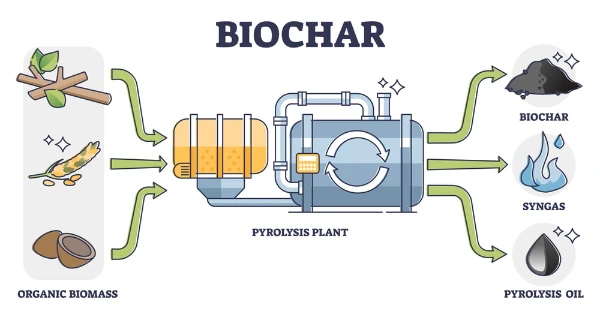
BioOilSolv’s technology is scalable and modular, which allows flexibility in feedstock selection and adaptability to various waste streams. The technology focuses on chemical extraction, allowing the synthesis of specialty chemicals, solvents, and additives, as compared to traditional pyrolysis, which mainly produces biofuels.
Moreover, this technology aids in industrial decarbonization by recycling waste, reducing greenhouse gas emissions, and offering sustainable substitutes for petrochemical products.
Further, Foresight Canada featured BioOilSolv as a notable company in the carbon management sector, highlighting its efforts to replace fossil fuels with waste from forestry, agriculture, and municipal sources to produce value-added chemicals.
5. Effex
- Founding Year: 2023
- Location: Leuven, Belgium
- Use For: Design of Experiments (DoE)
- Funding: EUR 1.6 million
Belgian startup Effex offers a data-driven platform that utilises design of experiments (DoE) techniques to optimize chemical research. The startup’s software aids researchers in planning, carrying out, and evaluating chemical experiments more effectively by combining statistical modeling with AI-assisted analytics.

The platform minimizes trial-and-error methods, which reduces material waste and speeds up R&D cycles by automating the selection of experimental conditions and real-time result analysis.
Its interface also simplifies collaboration for researchers and offers visualization capabilities for comprehending intricate chemical interactions.
Additionally, Effex benefits industries where accuracy and efficiency in experimentation are crucial, such as specialty chemicals and medicines. The startup improves research efficiency by using AI and machine learning to optimize experimental processes.
Want to Explore 220+ Chemical Engineering Startups & Scaleups?
6. MECHANO CROSS
- Founding Year: 2023
- Location: Hokkaido, Japan
- Use For: Mechanochemical Organic Synthesis Technology
- Funding: USD 1.35 million
Japanese startup MECHANO CROSS specializes in mechanochemical organic synthesis, a method that uses solid-state milling processes in place of conventional solvent-based reactions.
The method is a safer and more environmentally friendly option as it uses twin-screw extrusion and high-energy ball milling to create chemical reactions. It does not require large amounts of organic solvents.
This technique enables the usage of previously insoluble reagents, which also shortens reaction times and streamlines purification procedures. Additionally, mechanochemistry reduces undesirable byproducts by improving reaction efficiency and selectivity.

MECHANO CROSS’s solutions are beneficial in applications involving specialty chemicals, materials science, and pharmaceuticals where sustainability and accuracy are crucial.
Moreover, the startup reduces solvent waste, decreases production costs, and improves the environmental sustainability of chemical manufacturing by providing a cleaner and more energy-efficient synthesis alternative.
7. ChemInnovation
- Founding Year: 2023
- Location: Munster, Germany
- Use For: AI-supported GC-MS Evaluation
German startup ChemInnovation simplifies chemical analysis in research and industrial applications by creating AI-powered solutions for evaluating gas chromatography-mass spectrometry (GC-MS) data.
Its METIS software automates the interpretation of chromatograms by incorporating machine learning algorithms that identify molecular structures and quantify chemical compositions.
This speeds up data processing times and reduces human error without the need for manual peak identification. The platform offers real-time insights and completely analyzed chromatograms with structural suggestions, and it integrates easily with current GC-MS operations.
Moreover, ChemInnovation improves research efficiency and ensures more reliable data interpretation in domains, including material science, environmental monitoring, and medicines, by streamlining chemical analysis procedures.
Its AI-powered methodology improves chemical diagnostics’ precision and speed, proving businesses a tool for maximizing product development and quality assurance.
8. RarEarth
- Founding Year: 2022
- Location: Milan, Italy
- Use For: Rare Earth Recycling
Italian startup RarEarth offers an environmentally friendly process for rare earth element (REE) recycling, recovering neodymium, praseodymium, and dysprosium from end-of-life permanent magnets.
The startup’s chemical extraction process reduces the need for traditional acid-based leaching techniques by employing a non-toxic, reusable solvent to selectively dissolve rare earths. This technique enables closed-loop recycling, which permits recovered materials to be reincorporated into the supply chain for the manufacturing of new magnets.
Additionally, RarEarth’s offers a sustainable substitute that promotes resource circularity, unlike conventional minin,g which produces extensive trash and poses environmental risks.
It supports the long-term viability of the electronics, renewable energy, and automotive sectors by providing a more economical and environmentally friendly recycling option.
9. Deep Blue BioTech
- Founding Year: 2023
- Location: Stowmarket, UK
- Use For: Cyanobacteria Technology Platform
- Funding: USD 800K
UK-based startup Deep Blue BioTech engineers a cyanobacteria-based platform that converts atmospheric CO₂ into sustainable specialty chemicals. The startup utilises AI and synthetic biology to create cyanobacterial strains that generate bio-based substitutes for molecules obtained from petrochemicals.
This method reduces energy requirements and does not require fossil feedstocks by enabling direct microbial synthesis of high-value compounds under moderate conditions.

Its scalable bioprocessing method enables industrial output with low water and land requirements. This technology offers a route toward the production of carbon-negative chemicals and is beneficial in biodegradable materials, pharmaceuticals, and agriculture.
Moreover, Deep Blue BioTech’s solution supports global sustainability goals by combining CO₂ capture and bioengineering, allowing the industry to shift to the production of bio-based and renewable chemicals.
10. Linium Biochemicals
- Founding Year: 2023
- Location: Paris, France
- Use For: Green Aromatic Chemicals
French startup Linium Biochemicals turns lignin, a byproduct of wood production, into valuable chemical intermediates to create green aromatic compounds.
Its patented photochemical conversion process breaks down the complicated polymeric structure of lignin into bio-based monomers and oligomers. This provides a sustainable substitute for aromatic chemicals generated from petroleum.
It enables the sustainable manufacturing of essential compounds for coatings, adhesives, and specialized materials using this low-energy method. Linium Biochemicals decreases industrial carbon emissions and lessens reliance on fossil fuels by using available biomass feedstocks.
This scalable technology is easily integrated into current chemical manufacturing and biorefinery processes.
Moreover, the startup’s innovation provides companies with a sustainable way to generate necessary chemical building blocks by encouraging waste valorization and lowering the environmental impact of aromatic chemical synthesis.
Discover All Emerging Chemical Engineering Startups
The 10 chemical engineering startups showcased in this report are only a small sample of all startups we identified through our data-driven startup scouting approach. Download our free Industry Innovation Reports for a broad overview of the industry or get in touch for quick & exhaustive research on the latest technologies & emerging solutions that will impact your company in 2025!




